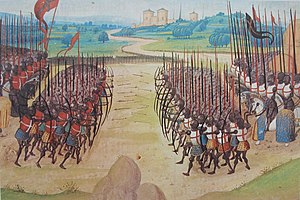 Global Information
Global InformationBattle of Agincourt information
| Battle of Agincourt | |||||||
|---|---|---|---|---|---|---|---|
| Part of the Hundred Years' War | |||||||
 The Battle of Agincourt, 15th-century miniature, Enguerrand de Monstrelet | |||||||
| |||||||
| Belligerents | |||||||
| Kingdom of England | Kingdom of France | ||||||
| Commanders and leaders | |||||||
|
| ||||||
| Strength | |||||||
|
6,000[1]–8,100 men[2] (modern estimates; see Numbers at Agincourt) • About 5⁄6 archers • 1⁄6 dismounted men-at-arms in heavy armour |
14,000–15,000 men[3] or up to 25,000 if counting armed servants[4] • 10,000 men-at-arms[5] • 4,000–5,000 archers and crossbowmen[6] • Up to 10,000 mounted and armed servants (gros valets) present[7] | ||||||
| Casualties and losses | |||||||
| Up to 600 killed (112 identified)[8][9] |
• 6,000 killed (most of whom were of the French nobility)[10][11] • 700–2,200 captured[12] | ||||||
The Battle of Agincourt (/ˈædʒɪnkɔːr(t)/ AJ-in-kor(t);[a] French: Azincourt [azɛ̃kuʁ]) was an English victory in the Hundred Years' War. It took place on 25 October 1415 (Saint Crispin's Day) near Azincourt, in northern France.[b] The unexpected English victory against the numerically superior French army boosted English morale and prestige, crippled France, and started a new period of English dominance in the war that would last for 14 years until England was defeated by France in 1429 during the Siege of Orléans.
After several decades of relative peace, the English had resumed the war in 1415 amid the failure of negotiations with the French. In the ensuing campaign, many soldiers died from disease, and the English numbers dwindled; they tried to withdraw to English-held Calais but found their path blocked by a considerably larger French army. Despite the numerical disadvantage, the battle ended in an overwhelming victory for the English.
King Henry V of England led his troops into battle and participated in hand-to-hand fighting. King Charles VI of France did not command the French army as he suffered from psychotic illnesses and associated mental incapacity. The French were commanded by Constable Charles d'Albret and various prominent French noblemen of the Armagnac party. This battle is notable for the use of the English longbow in very large numbers, with the English and Welsh archers comprising nearly 80 per cent of Henry's army. Henry's standard-bearer was William Harrington, he being an official Standard Bearer of England.
The Battle of Agincourt is one of England's most celebrated victories and was one of the most important English triumphs in the Hundred Years' War, along with the Battle of Crécy (1346) and Battle of Poitiers (1356). Perhaps the most notable example of a last stand of a heavily outnumbered force resulting in an outright victory, it continues to fascinate scholars and the general public into the modern day. It forms the backdrop to notable works such as William Shakespeare's play Henry V, written in 1599.
- ^ Barker 2015, pp. xvi–xvii, xxi, 220, 229, 276, 388–392; Rogers 2008, pp. 42, 114–121; Sumption 2015, pp. 441, 814 (n. 11)
- ^ Mortimer 2009, p. 566.
- ^ Rogers 2008, pp. 57, 59 (n. 71); Mortimer 2009, pp. 565, 566; Sumption 2015, pp. 449, 815 (n. 20); Curry 2000, p. 102
- ^ Rogers 2008, pp. 60–62.
- ^ Rogers 2008, pp. 57–59; Sumption 2015, pp. 452–453; Mortimer 2009, pp. 429; Curry 2000, p. 181
- ^ Rogers 2008, pp. 57, 62–63; Mortimer 2009, pp. 422, 565
- ^ Rogers 2008, pp. 57, 60–62.
- ^ Curry 2000, p. 12.
- ^ Barker 2015, p. 320.
- ^ Curry 2006, pp. 187, 192, 233, 248.
- ^ Sumption 2015, pp. 459, 461.
- ^ Barker 2015, pp. 337, 367, 368.
- ^ Merriam-Webster has a small audio file here: "Agincourt". Merriam-Webster Pronunciation. Retrieved 26 October 2014.
- ^ Olausson, Lena; Sangster, Catherine (2006). Oxford BBC Guide to Pronunciation: The Essential Handbook of the Spoken Word. Oxford, England: Oxford University Press. p. 7. ISBN 978-0-19-280710-6.
aj-in-kor/ˈadʒɪnˌkɔː(r)/ the established anglicization
- ^ Jones, Daniel (2003). Roach, Peter; et al. (eds.). English Pronouncing Dictionary (16th ed.). Cambridge, England: Cambridge University Press. p. 12. ISBN 978-0-521-01712-1.
- ^ As in this interview with Juliet Barker: "Juliet Barker". Meet the Author. Archived from the original on 21 February 2014. Retrieved 26 October 2014.
Cite error: There are <ref group=lower-alpha> tags or {{efn}} templates on this page, but the references will not show without a {{reflist|group=lower-alpha}} template or {{notelist}} template (see the help page).